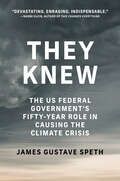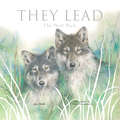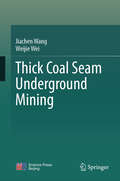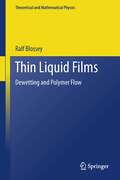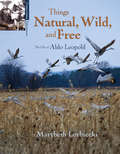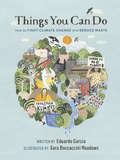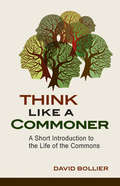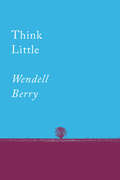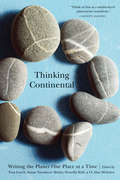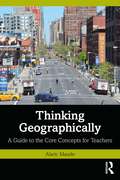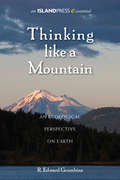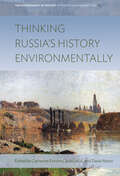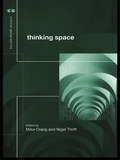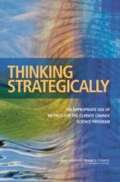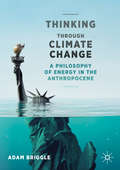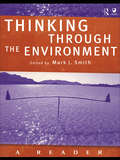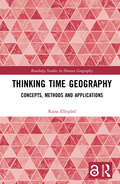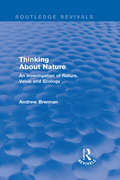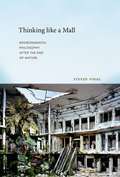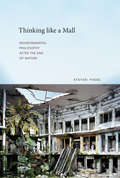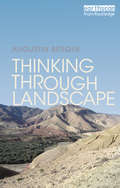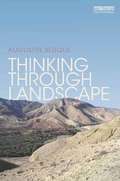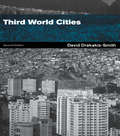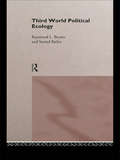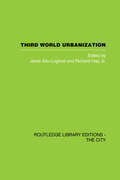- Table View
- List View
They Knew: The US Federal Governments Fifty-Year Role in Causing the Climate Crisis
by James Gustave SpethA devastating, play-by-play account of the federal government's leading role in bringing about today's climate crisis.In 2015, a group of twenty-one young people sued the federal government for violating their constitutional rights by promoting the climate catastrophe, depriving them of life, liberty, and property without due process of law. They Knew offers evidence for their claims, presenting a devastating, play-by-play account of the federal government's role in bringing about today's climate crisis. James Speth, tapped by the plaintiffs as an expert on climate, documents how administrations from Carter to Trump--despite having information about climate change and the connection to fossil fuels--continued aggressive support of a fossil fuel based energy system. What did the federal government know and when did it know it? Speth asks, echoing another famous cover up. What did the federal government do and what did it not do? They Knew (an updated version of the Expert Report Speth prepared for the lawsuit) presents the most compelling indictment yet of the government's role in the climate crisis, showing a forty-year failure to take action. Since Juliana v. United States was filed, the federal government has repeatedly delayed the case. Yet even in legal limbo, it has helped inspire a generation of youthful climate activists. An Our Children&’s Trust Book
They Lead: The Wolf Pack
by June SmallsThey are the leaders. The creators of the pack. She digs the den, where their young will grow. He patrols the territory and brings her food while she cares for the helpless pups. As seasons pass, and new litters arrive, the pack grows and all work together to raise the young. A wolf&’s piercing howl can carry up to 10 miles, raising goosebumps on even the most intrepid camper&’s skin. But the gray wolf is far from a simple predator. An incredible combination of teamwork and instinct has helped wolf packs survive, despite being endangered in most of North America. With a mother wolf and father wolf leading the pack–their family–together, the cubs grow and learn the skills they need to start their own pack someday. With stunning, lifelike illustrations and facts on each page for grownups or older children who want a deeper dive, this beautiful picture book is a monument to these majestic packs.
Thick Coal Seam Underground Mining
by Jiachen Wang Weijie WeiThis book systematically summarizes the main technology and latest advancements of China's thick coal seam underground mining technology. It covers the mine development methods, the top coal caving technology and drawing mechanism, the measurement of top coal recovery and technology to improve the recovery ratio, the large mining height technology and coal wall stability control, large cross-section roadway support technology, slicing mining technology and roadway layout, intelligent mining technology and advancements, theories and techniques for controlling surrounding rock in thick coal seam, as well as some typical cases of top coal caving and large mining height. This book can serve as a teaching reference for graduate students in mining engineering and senior undergraduate students at higher education institutions. It is also suitable for researchers, engineering technicians, designers, and relevant technology management personnel engaged in coal mining.
Thin Liquid Films
by Ralf BlosseyThis book is a treatise on the thermodynamic and dynamic properties of thin liquid films at solid surfaces and, in particular, their rupture instabilities. For the quantitative study of these phenomena, polymer thin films (sometimes referred to as "ultrathin") have proven to be an invaluable experimental model system. What is it that makes thin film instabilities special and interesting? First, thin polymeric films have an important range of applications. An understanding of their instabilities is therefore of practical relevance for the design of such films. The first chapter of the book intends to give a snapshot of current applications, and an outlook on promising future ones. Second, thin liquid films are an interdisciplinary research topic, which leads to a fairly heterogeneous community working on the topic. It justifies attempting to write a text which gives a coherent presentation of the field which researchers across their specialized communities might be interested in. Finally, thin liquid films are an interesting laboratory for a theorist to confront a well-established theory, hydrodynamics, with its limits. Thin films are therefore a field in which a highly fruitful exchange and collaboration exists between experimentalists and theorists. The book stretches from the more concrete to more abstract levels of study: we roughly progress from applications via theory and experiment to rigorous mathematical theory. For an experimental scientist, the book should serve as a reference and guide to what is the current consensus of the theoretical underpinnings of the field of thin film dynamics. Controversial problems on which such a consensus has not yet been reached are clearly indicated in the text, as well as discussed in a final chapter. From a theoretical point of view, the field of dewetting has mainly been treated in a mathematically 'light' yet elegant fashion, often making use of scaling arguments. For the untrained researcher, this approach is not always easy to follow. The present book attempts to bridge between the 'light' and the 'rigorous', always with the ambition to enhance insight and understanding - and to not let go the elegance of the theory.
Things Natural, Wild, and Free
by Marybeth LorbieckiAs a child, Aldo Leopold was always looking for adventures in nature. This led Leopold to become a forester, wildlife scientist, author, and ultimately one of the most well-known conservationists in American history. Award-winning author Marybeth Lorbiecki brings Leopold to life in this biography enhanced with historic photographs and a school resource section.Marybeth Lorbiecki is the author of more than twenty-five books for children and adults, and she teaches upper-level college writing and children's literature as an adjunct university professor. Her adult biography Aldo Leopold: A Fierce Green Fire earned a Minnesota Book Award.
Things You Can Do: How to Fight Climate Change and Reduce Waste
by Eduardo GarciaLearn what you can do right now to reduce your carbon footprint with this inspiring, accessible, stunningly illustrated book based on Eduardo Garcia&’s popular New York Times column. &“This beautiful and practical book on the climate crisis is for people of all ages, packed with wonderful pictures, powerful stats, and sound advice.&”—Mike Berners-Lee, author of There Is No Planet BAward-winning climate journalist Eduardo Garcia offers a deeply researched and user-friendly guide to the things we can do every day to fight climate change. Based on his popular New York Times column &“One Thing You Can Do,&” this fully illustrated book proposes simple solutions for an overwhelming problem. No lectures here—just accessible and inspiring ideas to slash emissions and waste in our daily lives, with over 350 explanatory illustrations by talented painter Sara Boccaccini Meadows.In each chapter, Garcia digs into the issue, explaining how everyday choices lead to carbon emissions, then delivers a wealth of &“Things You Can Do&” to make a positive impact, such as:• Eat a climate-friendly diet• Reduce food waste• Cool your home without an air conditioner• Save energy at home• Adopt zero-waste practices• Increase the fuel efficiency of your car• Buy low-carbon pet food• Hack your toilet to save water• Slash the carbon footprint of your online shoppingDelivering a decisive hit of knowledge with every turn of the page, Things You Can Do is the book for people who want to know more—and do more—to save the planet.
Think Like a Commoner
by David BollierThe biggest "tragedy of the commons" is the misconception that commons are failures--relics from another era rendered unnecessary by the market and state. Think Like a Commoner dispels such prejudices by explaining the rich history and promising future of the commons--an ageless paradigm of cooperation and fairness that is re-making our world.With graceful prose and dozens of fascinating stories, David Bollier describes the quiet revolution that is pioneering practical forms of self-governance and production controlled by people themselves. Think Like a Commoner explains how the commons: Is an exploding field of DIY innovation ranging from Wikipedia and seed-sharing to community forests, collaborative consumption, and beyond Challenges the standard narrative of market economics by explaining how cooperation generates significant value and human fulfillment Provides a framework of law and social action that can help us move beyond the pathologies of neoliberal capitalismWe have a choice: ignore the commons and suffer the ongoing private plunder of our common wealth, or Think Like a Commoner and learn how to rebuild our society and reclaim our shared inheritance. This accessible, comprehensive introduction to the commons will surprise and enlighten you, and provoke you to action.David Bollier is an author, activist, blogger, and independent scholar. He is the author of six books on different aspects of the commons, including Green Governance, The Wealth of the Commons, and Viral Spiral, and is a frequent speaker at conferences, colleges and universities, and policy workshops.
Think Little: Essays (Counterpoints #1)
by Wendell BerryFirst published in 1972, “Think Little” is cultural critic and agrarian Wendell Berry at his best: prescient about the dire environmental consequences of our mentality of greed and exploitation, yet hopeful that we will recognize war and oppression and pollution not as separate issues, but aspects of the same. “Think Little” is presented here alongside one of Berry’s most popular and personal essays, “A Native Hill.” This gentle essay of recollection is told alongside a poetic lesson in geography, as Berry explains at length and in detail, that what he stands for is what he stands on.Each palm–size book in the Counterpoints series is meant to stay with you, whether safely in your pocket or long after you turn the last page. From short stories to essays to poems, these little books celebrate our most–beloved writers, whose work encapsulates the spirit of Counterpoint Press: cutting–edge, wide–ranging, and independent.
Thinking Continental: Writing the Planet One Place at a Time
by Tom Lynch Susan Naramore Maher O. Alan Weltzien Drucilla WallIn response to the growing scale and complexity of environmental threats, this volume collects articles, essays, personal narratives, and poems by more than forty authors in conversation about “thinking continental”—connecting local and personal landscapes to universal systems and processes—to articulate the concept of a global or planetary citizenship.Reckoning with the larger matrix of biome, region, continent, hemisphere, ocean, and planet has become necessary as environmental challenges require the insights not only of scientists but also of poets, humanists, and social scientists. Thinking Continental braids together abstract approaches with strands of more-personal narrative and poetry, showing how our imaginations can encompass the planetary while also being true to our own concrete life experiences in the here and now.
Thinking Geographically: A Guide to the Core Concepts for Teachers
by Alaric MaudeThis book explains how the concepts of geography can teach young people to think geographically, deeply and ethically. Thinking Geographically demonstrates how the concepts of place, space, environment and interconnection teach students new ways of perceiving and understanding the world, the concepts of scale and time teach them ways of analysing the world, while the concepts of sustainability and wellbeing show them how to evaluate and reflect on what they observe, and all eight concepts develop their higher order and critical thinking. To further support teachers, this book includes a chapter on how to teach for conceptual understanding, as well as two chapters that illustrate the application of geographical thinking to an understanding of the effects of land cover change and the problem of regional inequality. Rich with practical examples, this book is an essential resource for geography teachers, whether already teaching or studying to become one, and for those who teach therm.
Thinking Like a Mountain: An Ecological Perspective on Earth (Island Press E-ssentials)
by R. Edward GrumbineIn Thinking Like a Mountain, we have excerpted a clear and inviting introduction to the science of conservation biology from Ed Grumbine's previous book, Ghost Bears. Grumbine offers a succinct and evocative description of why we should all care about biodiversity, protected lands, connectivity, and extinction rates, and the advantages to be gained by attempting to 'think like a mountain', as so eloquently phrased by Aldo Leopold.
Thinking Russia's History Environmentally (Environment in History: International Perspectives #25)
by Catherine Evtuhov, Julia Lajus, and David MoonHistorians of Russia were relative latecomers to the field of environmental history. Yet, in the past decade, the exploration of Russian environmental history has burgeoned. Thinking Russia’s History Environmentally showcases collaboration amongst an international set of scholars who focus on the contribution that the study of Russian environments makes to the global environmental field. Through discerning analysis of natural resources, the environment as a factor in historical processes such as industrialization, and more recent human-animal interactions, this volume challenges stereotypes of Russian history and in so doing, highlights the unexpected importance of Russian environments across a time frame well beyond the ecological catastrophes of the Soviet period.
Thinking Space (Critical Geographies)
by Mike Crang Nigel ThriftAs theorists have begun using geographical concepts and metaphors to think about the complex and differentiated world, it is important to reflect on their work, and its impact on our thoughts on space. This revealing book explores the work of a wide range of prolific social theorists. Included contributions from an impressive range of renowned geographical writers, each examine the work of one writer - ranging from early this century to contemporary writers. Among the writers discussed are Georg Simmel, Mikhail Bakhtin, Gilles Deleuze, Helene Cixous, Henri Lefebvre, Jacques Lacan, Pierre Bourdieu, Michel Foucault and Franz Fanon. Ideal for those interested in the 'spatial turn' in social and cultural theory, this fascinating book asks what role space plays in the work of such theorists, what difference (if any) it makes to their concepts, and what difference such an appreciation makes to the way we might think about space.
Thinking Strategically: The Appropriate Use Of Metrics For The Climate Change Science Program
by National Research Council of the National AcademiesThe Climate Change Science Program (CCSP) and its predecessor U.S. Global Change Research Program have sponsored climate research and observations for nearly 15 years, yet the overall progress of the program has not been measured systematically. Metrics—a system of measurement that includes the item being measured, the unit of measurement, and the value of the unit—offer a tool for measuring such progress; improving program performance; and demonstrating program successes to Congress, the Office of Management and Budget, and the public. This report lays out a framework for creating and implementing metrics for the CCSP. A general set of metrics provides a starting point for identifying the most important measures, and the principles provide guidance for refining the metrics and avoiding unintended consequences.
Thinking Through Climate Change: A Philosophy of Energy in the Anthropocene (Palgrave Studies in the Future of Humanity and its Successors)
by Adam BriggleIn this creative exploration of climate change and the big questions confronting our high-energy civilization, Adam Briggle connects the history of philosophy with current events to shed light on the Anthropocene (the age of humanity). Briggle offers a framework to help us understand the many perspectives and policies on climate change. He does so through the idea that energy is a paradox: changing sameness. From this perennial philosophical mystery, he argues that a high-energy civilization is bound to create more and more paradoxes. These paradoxes run like fissures through our orthodox picture of energy as the capacity to do work and control fate. Climate change is the accumulation of these fissures and the question is whether we can sustain technoscientific control and economic growth. It may be that our world is about change radically, imploring us to start thinking heterodox thoughts.
Thinking Through the Environment: A Reader
by Mark J. SmithThis reader brings together material from ecological thought, environmental policy, environmental philosophy, social and political thought, historical sociology and cultural studies. The extracts tell the story of the way the natural environment has been understood in the modern world and how this has recently been questioned as contemporary societies are seen as characterised by uncertainty and complexity.The literature guides the reader through the conventiaonal grounds for thinking about rights and obligations in relation to future generations, non-human animals and the biotic commununities, bringing each into question. This then leads into a critical examination of social and political theories and their capacity for drawing on ecological thought. Each of the seven sections of readings is introduced by the editor who locates the set of readings within the specific themes and issues at the heart of each section.This broad-reaching and thought-provoking set of readings stresses the diversity of response to environmental problems both within and between anthropocentric and ecocentric approaches and will encourage the reader to examine how they are manifested in the areas of environmental ethics, policy analysis and social and political theory.
Thinking Time Geography: Concepts, Methods and Applications (Routledge Studies in Human Geography)
by Kajsa EllegårdTime-geography is a mode of thinking that helps in the understanding of change in society, the wider context and ecological consequences of human actions. This book presents its assumptions, concepts and methods, and example applications. The intellectual path of the Swedish geographer Torsten Hägerstrand is a key foundation for this book. His research contributions are shown in the context of the urbanization of Sweden, involvement in the emerging planning sector and empirical studies on Swedish emigration. Migration and innovation diffusion studies paved the way for prioritizing time and space dimensions and recognizing time and space as unity. From these insights time-geography grew. This book includes the ontological grounds and concepts as well as the specific notation system of time-geography – a visual language for interdisciplinary research and communication. Applications are divided into themes: urban and regional planning; transportation and communication; organization of production and work; everyday life, wellbeing and household division of labor; and ecological sustainability – time-geographic studies on resource use. This book looks at the outlook for this developing branch of research and the future application of time-geography to societal and academic contexts. Its interdisciplinary nature will be appealing to postgraduates and researchers who are interested in human geography, urban and regional planning and sociology.
Thinking about Nature: An Investigation of Nature, Value and Ecology (Routledge Revivals)
by Andrew BrennanEcology – unlike astronomy, physics, or chemistry – is a science with an associated political and ethical movement: the Green Movement. As a result, the ecological position is often accompanied by appeals to holism, and by a mystical quasi-religious conception of the ecosystem. In this title, first published in 1988, Andrew Brennan argues that we can reduce much of the mysticism surrounding ecological discussions by placing them within a larger context, and illustrating that our individual interests are bound with larger, community interests. Using an interdisciplinary approach, which bridges the gap between the sciences, philosophy, and ethics, this is an accessible title, which will be of particular value to students with an interest in the philosophy of environmental science and ethics.
Thinking like a Mall
by Steven VogelEnvironmentalism, in theory and practice, is concerned with protecting nature. But if we have now reached "the end of nature," as Bill McKibben and other environmental thinkers have declared, what is there left to protect? In Thinking like a Mall, Steven Vogel argues that environmental thinking would be better off if it dropped the concept of "nature" altogether and spoke instead of the "environment" -- that is, the world that actually surrounds us, which is always a built world, the only one that we inhabit. We need to think not so much like a mountain (as Aldo Leopold urged) as like a mall. Shopping malls, too, are part of the environment and deserve as much serious consideration from environmental thinkers as do mountains. Vogel argues provocatively that environmental philosophy, in its ethics, should no longer draw a distinction between the natural and the artificial and, in its politics, should abandon the idea that something beyond human practices (such as "nature") can serve as a standard determining what those practices ought to be. The appeal to nature distinct from the built environment, he contends, may be not merely unhelpful to environmental thinking but in itself harmful to that thinking. The question for environmental philosophy is not "how can we save nature?" but rather "what environment should we inhabit, and what practices should we engage in to help build it?"
Thinking like a Mall: Environmental Philosophy after the End of Nature (The\mit Press Ser.)
by Steven VogelA provocative argument that environmental thinking would be better off if it dropped the concept of “nature” altogether and spoke instead of the built environment.Environmentalism, in theory and practice, is concerned with protecting nature. But if we have now reached “the end of nature,” as Bill McKibben and other environmental thinkers have declared, what is there left to protect? In Thinking like a Mall, Steven Vogel argues that environmental thinking would be better off if it dropped the concept of “nature” altogether and spoke instead of the “environment”—that is, the world that actually surrounds us, which is always a built world, the only one that we inhabit. We need to think not so much like a mountain (as Aldo Leopold urged) as like a mall. Shopping malls, too, are part of the environment and deserve as much serious consideration from environmental thinkers as do mountains. Vogel argues provocatively that environmental philosophy, in its ethics, should no longer draw a distinction between the natural and the artificial and, in its politics, should abandon the idea that something beyond human practices (such as “nature”) can serve as a standard determining what those practices ought to be. The appeal to nature distinct from the built environment, he contends, may be not merely unhelpful to environmental thinking but in itself harmful to that thinking. The question for environmental philosophy is not “how can we save nature?” but rather “what environment should we inhabit, and what practices should we engage in to help build it?”
Thinking through Landscape
by Augustin BerqueOur attitude to nature has changed over time. This book explores the historical, literary and philosophical origins of the changes in our attitude to nature that allowed environmental catastrophes to happen.The book presents a philosophical reflection on human societies’ attitude to the environment, informed by the history of the concept of landscape and the role played by the concept of nature in the human imagination. It features a wealth of examples from around the world to help understand the contemporary environmental crisis in the context of both the built and natural environment. Berque locates the start of this change in human labour and urban elites being cut off from nature. Nature became an imaginary construct masking our real interaction with the natural world. He argues that this gave rise to a theoretical and literary appreciation of landscape at the expense of an effective practical engagement with nature. This mindset is a general feature of the world's civilizations, manifested in similar ways in different cultures across Europe, China, North Africa and Australia. Yet this approach did not have disastrous consequences until the advent of western industrialization.As a phenomenological hermeneutics of human societies’ environmental relation to nature, the book draws on Heideggerian ontology and Veblen’s sociology. It provides a powerful distinction between two attitudes to landscape: the tacit knowledge of earlier peoples engaged in creating the landscape through their work - “landscaping thought”- and the explicit theoretical and aesthetic attitudes of modern city dwellers who love nature while belonging to a civilization that destroys the landscape - “landscape thinking”. This book gives a critical survey of landscape thought and theory for students, researchers and anyone interested in human societies’ relation to nature in the fields of landscape studies, environmental philosophy, cultural geography and environmental history.
Thinking through Landscape
by Augustin BerqueOur attitude to nature has changed over time. This book explores the historical, literary and philosophical origins of the changes in our attitude to nature that allowed environmental catastrophes to happen. It presents a philosophical reflection on human societies’ attitude to the environment, informed by the history of the concept of landscape and the role played by the concept of nature in the human imagination and features a wealth of examples from around the world to help understand the contemporary environmental crisis in the context of both the built and natural environment. Thinking Through Landscape locates the start of this change in human labour and urban elites being cut off from nature. Nature became an imaginary construct masking our real interaction with the natural world. The book argues that this gave rise to a theoretical and literary appreciation of landscape at the expense of an effective practical engagement with nature. It draws on Heideggerian ontology and Veblen’s sociology, providing a powerful distinction between two attitudes to landscape: the tacit knowledge of earlier peoples engaged in creating the landscape through their work - "landscaping thought"- and the explicit theoretical and aesthetic attitudes of modern city dwellers who love nature while belonging to a civilization that destroys the landscape - "landscape thinking". This book gives a critical survey of landscape thought and theory for students, researchers and anyone interested in human societies’ relation to nature in the fields of landscape studies, environmental philosophy, cultural geography and environmental history.
Third World Cities (Routledge Perspectives on Development)
by David Drakakis-SmithThis imformative book is a thoroughly revised and updated edition of the classic introduction to urbanization in developing areas. Using case studies of cities drawn from around the world, including Bangkok, Delhi, Manila, Mexico City, Singapore and cities in Zimbabwe, this key text confronts three main questions: Is there still a Third World, does it have a common urban form, and what is the relationship between urbanization and sustainability? The text analyzes: the dimension of urban growth in the third world historical perspectives on urban growth urban population growth employment and incomes in the city basic needs and human rights environmental problems in third world cities planning and management of cities. Containing a wealth of student-friendly features including boxed case-studies, discussion questions and guides for further reading, this text provides an invaluable introduction to the issues and processes of the city in the Third World. Containing a greater depth of content and referencing, and with new chapters and subjects covered, this new second edition utilizes its larger format to make extensive use of illustrations, diagrams, global case studies, and further reading. Overall, these changes have contributed to this book's continuance as an extremely accessible student text.
Third World Political Ecology: An Introduction
by Sinead Bailey Raymond BryantAn effective response to contemporary environmental problems demands an approach that integrates political, economic and ecological issues. Third World Political Ecology provides an introduction to an exciting new research field that aims to develop an integrated understanding of the political economy of environmental change in the Third World. The authors review the historical development of the field, explain what is distinctive about Third World political ecology, and suggest areas for future development. Clarifying the essentially politicised condition of environmental change today, the authors explore the role of various actors - states, multilateral institutions, businesses, environmental non-governmental organisations, poverty-stricken farmers, shifting cultivators and other 'grassroots' actors - in the development of the Third World's politicised environment. Third World Political Ecology is the first major attempt to explain the development and characteristics of environmental problems that plague parts of Asia, Africa and Latin America. Drawing on examples from throughout the Third World, the book will be of interest to all those who wish to understand the political and economic bases of the Third World's current predicament.
Third World Urbanization
by J. Abu-Lughod R. Jr HayFirst published in 2006. Routledge is an imprint of Taylor & Francis, an informa company.
